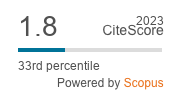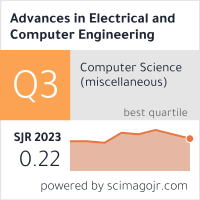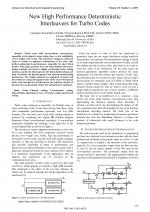| 2/2010 - 22 |
New High Performance Deterministic Interleavers for Turbo CodesLAZAR, G. A. |
| View the paper record and citations in |
| Click to see author's profile in |
| Download PDF |
Author keywords
channel coding, concatenated coding, deterministic algorithms, error correction coding, interleaved coding
References keywords
turbo(8), codes(6), theory(4), interleavers(4), information(4)
Blue keywords are present in both the references section and the paper title.
About this article
Date of Publication: 2010-05-31
Volume 10, Issue 2, Year 2010, On page(s): 125 - 129
ISSN: 1582-7445, e-ISSN: 1844-7600
Digital Object Identifier: 10.4316/AECE.2010.02022
Web of Science Accession Number: 000280312600022
SCOPUS ID: 77954639592
Abstract
Turbo codes offer extraordinary performance, especially at low signal to noise ratios, due to a low multiplicity of low weight code words. The interleaver design is critical in order to realize an apparent randomness of the code, thus further enhancing its performance, especially for short block frames. This paper presents four new deterministic interleaver design methods, that lead to highly performing turbo coding systems, namely the block-spread, the block-backtracking and their variations the linearly-spread and linearly-backtracking interleavers. The design methods are explained in depth and the results are compared against some of the most wide-spread turbo code interleavers. Furthermore, the selection method of the generator polynomials used in the simulations is explained. |
| References | | | Cited By «-- Click to see who has cited this paper |
| [1] A. H. S. Mohammadi, W. Zhuang, "Variance of the Turbo Code Performance Bound over the Interleavers", IEEE Transactions on Information Theory, vol. 48, no. 7, pp. 2078-2086, 2002. [CrossRef] [Web of Science Times Cited 4] [SCOPUS Times Cited 6] [2] M. C. Valenti and J. Sun, "The UMTS Turbo Code and an Efficient Decoder Implementation Suitable for Software-Defined Radios", International Journal of Wireless Information Networks, vol. 8, no. 4, 2001, pp. 203-215, 2001. [3] X. Zou, M.Wang, G. Feng, "A New Interleaver Design for Iteratively Decoded Bit-Interleaved Coded Modulation", International Journal of Soft Computing 3 (5), Medwell Journals, pp. 338-343, 2008. [4] P. Robertson, "Illuminating the Structure of Code and Decoder of parallel concatenated recursive systematic (turbo) codes", IEEE International Conference on Communications (ICC), pp. 1298-1303, 1994. [CrossRef] [5] B. G. Lee, S. J. Bae, C. K. Jeong, E. K. Joo, "Performance Analysis of Swap Interleaver for Turbo Codes", Electronics Letters, vol. 35, no. 32, pp. 1939-1940, 1999. [CrossRef] [Web of Science Times Cited 3] [SCOPUS Times Cited 4] [6] C. Avenacio-Leon, "Analysis of the Dispersion and Spreading Properties of Interleavers for Turbo Codes", Computing Research Conference, CRC, 2004. [7] O. Takeshita, "Permutation Polynomial Interleavers: An Algebraic-Geometric Perspective", IEEE Transactions on Information Theory, vol. 53, no. 6, 2007. [CrossRef] [Web of Science Times Cited 63] [SCOPUS Times Cited 70] [8] K. Andrews, C. Heegard, D. Kozen, "A Theory of Interlavers", Cornell University Press, 1997. [9] S. Crozier, "New High-Spread High-Distance Interleavers for Turbo-Codes", 20th Biennial Symposium on Communications, Kingston, pp. 3-7, May 2000. [10] L. Perez, J. Seghers, D. Costello, "A Distance Spectrum Interpretation of Turbo Codes", IEEE Transactions of Information Theory, special issue on coding and complexity, pp. 1698-1709, 1996. [CrossRef] [Web of Science Times Cited 285] [SCOPUS Times Cited 360] [11] R. Garello, F. Chiaraluce, P. Pierleoni, M. Scaloni, S. Benedetto, "On the Error Floor and Free Distance of Turbo Codes", IEEE International Conference on Communications, pp.45-69, 2001. [CrossRef] [SCOPUS Times Cited 43] Web of Science® Citations for all references: 355 TCR SCOPUS® Citations for all references: 483 TCR Web of Science® Average Citations per reference: 32 ACR SCOPUS® Average Citations per reference: 44 ACR TCR = Total Citations for References / ACR = Average Citations per Reference We introduced in 2010 - for the first time in scientific publishing, the term "References Weight", as a quantitative indication of the quality ... Read more Citations for references updated on 2024-07-21 03:35 in 43 seconds. Note1: Web of Science® is a registered trademark of Clarivate Analytics. Note2: SCOPUS® is a registered trademark of Elsevier B.V. Disclaimer: All queries to the respective databases were made by using the DOI record of every reference (where available). Due to technical problems beyond our control, the information is not always accurate. Please use the CrossRef link to visit the respective publisher site. |
Faculty of Electrical Engineering and Computer Science
Stefan cel Mare University of Suceava, Romania
All rights reserved: Advances in Electrical and Computer Engineering is a registered trademark of the Stefan cel Mare University of Suceava. No part of this publication may be reproduced, stored in a retrieval system, photocopied, recorded or archived, without the written permission from the Editor. When authors submit their papers for publication, they agree that the copyright for their article be transferred to the Faculty of Electrical Engineering and Computer Science, Stefan cel Mare University of Suceava, Romania, if and only if the articles are accepted for publication. The copyright covers the exclusive rights to reproduce and distribute the article, including reprints and translations.
Permission for other use: The copyright owner's consent does not extend to copying for general distribution, for promotion, for creating new works, or for resale. Specific written permission must be obtained from the Editor for such copying. Direct linking to files hosted on this website is strictly prohibited.
Disclaimer: Whilst every effort is made by the publishers and editorial board to see that no inaccurate or misleading data, opinions or statements appear in this journal, they wish to make it clear that all information and opinions formulated in the articles, as well as linguistic accuracy, are the sole responsibility of the author.





